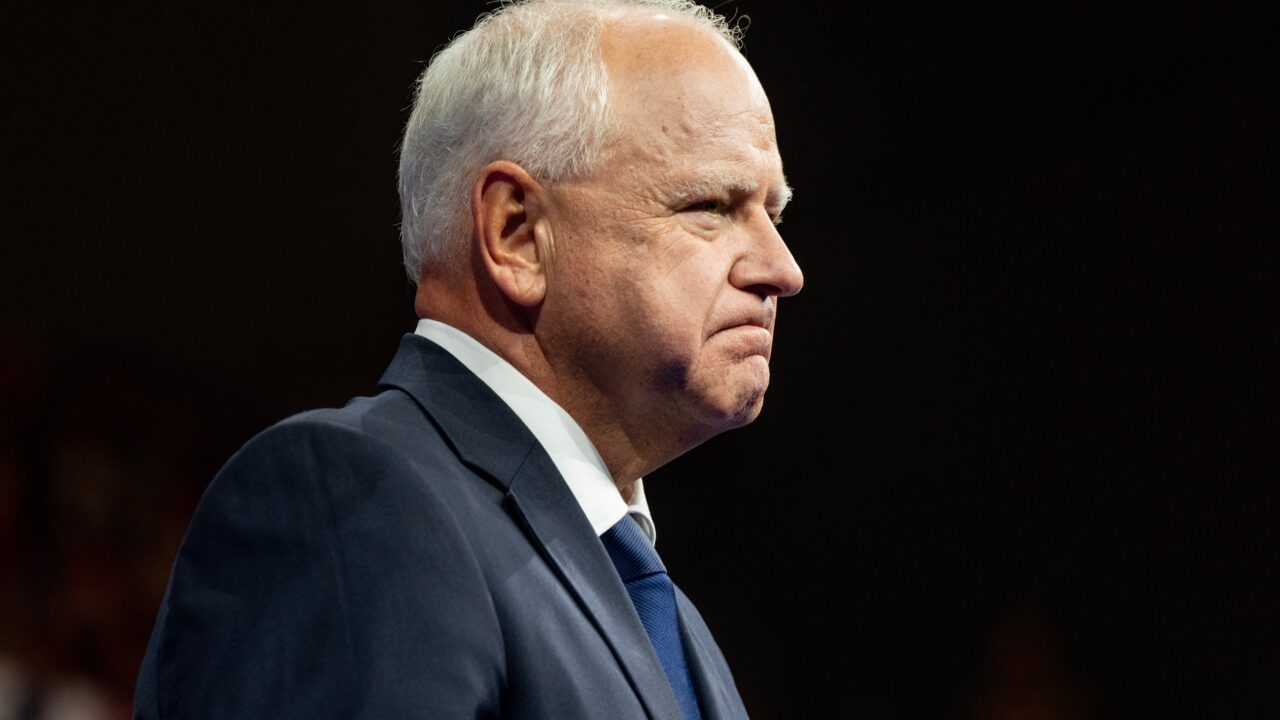At the VP Debate, Walz Revealed Democrats’ Destructive Vision for America

Editor's Note
Frank Cannon argues that in the recent vice-presidential debate Tim Walz revealed that the real motive of the Destructive Left is to destroy America.
Walz let slip the Democrats’ true vision of an American future. We should listen closely.
Much of the commentary on last week’s vice-presidential debate has focused on Tim Walz’s subpar performance in terms of rhetoric and style. There certainly was enough there to fill more than one post-debate analysis: Walz’s verbal stumbles, his deer-in-the-headlights stares into the camera, his awkward admission of his “knucklehead[ed]” tendency to “misspeak” in ways that inflate his own resume, and, of course, that moment when he said he was friends with school shooters.
But in a way, Walz’s stylistic eccentricities masked a far more troubling aspect of his performance. Beneath his shambolic aw-shucks veneer, Walz’s answers did provide actual substance as to how he and his running mate would govern. And the vision he laid out was truly alarming.
Let’s start first at the end. Reporters have grasped at straws by focusing on the supposedly shocking “revelation” late in the debate that the Trump ticket believes the 2020 election was fundamentally unfair. Putting aside the fact that Trump is right, it’s hard to believe anyone is still surprised by this. It’s hardly a scoop to “discover” that Trump’s VP pick believes something that Trump has openly argued for the past four years.
What was actually shocking was Walz’s defense, during the same exchange, of political censorship. When JD Vance pressed him over Kamala Harris’s desire to “censor people who engage in ‘misinformation,’” Walz all but shrugged it off. In Walz’s telling, sharing COVID “misinformation” (i.e. unapproved narratives that generally turn out to be true), or promoting the Hunter Biden laptop story, is like “yell[ing] fire [falsely] in a crowded theater. That’s the test. That’s the Supreme Court test.” In other words, he believes the simple act of publicly advocating something our bureaucratic “experts” disagree with is not protected by the First Amendment, and could therefore, in theory, be an imprisonable offense.
So, what is censorship then, in Walz’s view, if the government removing and punishing unsanctioned speech doesn’t count? He helpfully explained, “Censorship is book banning.” “Book banning,” to clarify, is the Democrats’ term for the efforts by parents to remove explicit graphic novels, such as Genderqueer, from their children’s public elementary school libraries. So to sum up Walz’s thinking, the government trying to ban you from Facebook for opposing toddler-masking is constitutionally sound, but stopping schools from foisting pornographic contenton 10-year-olds is the real threat to democracy. It’s so insane, one would find it difficult to believe if Democrats like Walz didn’t consistently proclaim it out loud.
Sadly, this wasn’t the only instance of left-wing insanity on display. Take Walz’s answer on gun rights for another example. Over the last couple months, Democrats have tried to make overtures to the millions of Americans who own a firearm by touting Kamala Harris’s own gun ownership, arguing by implication that she would never take anyone’s guns away. The Midwesterner Walz—with his camo hats, National Guard service, and canned references to football and pheasant hunting—was supposed to be helpful in making these kinds of overtures. Instead, in the debate, he gave the game away.
While JD Vance’s answer to the problem of gun violence was straightforward and detailed—with calls to address inner-city shootings, intrusions by international gangs through our southern border, the suicide and mental health epidemic, and school security—this was all too much in Walz’s view. He accused Vance, bizarrely, of stigmatizing and scapegoating the mentally ill, and he offered his own “solution” instead: “Sometimes it just is the guns. It’s just the guns.” The existence of guns, not shooters, is evidently the only problem Walz feels the need to address. This will not be a comfort to any American who owns one.
Walz took a similarly reductionist approach on other issues throughout the debate. On immigration, when Vance noted that suddenly plopping tens of thousands of people into a random small town will obviously lower wages, drive up housing costs, and stretch community resources even thinner than before, Walz responded by accusing him of dehumanizing other human beings and waved off these clear problems as mere bigotry. When Walz was confronted with his past – verifiably false statements about his China travels – he rambled about his upbringing in Nebraska before confessing to be a “knucklehead.” And when pushed by Vance on whether the state abortion law he signed would allow doctors to withhold care to babies born alive during an attempted abortion, he obfuscated and changed the subject – a revealing response in itself.
Up to now, Democrats have been trying to skate through the election with a largely recordless candidate giving largely substanceless answers in a few, friendly interviews. They hope they can blitz their way through a drastically shortened campaign before voters realize what they actually stand for. But Walz’s shaky debate performance made that task much more difficult. His inability to remember his campaign team’s soundbites led him to commit the biggest sin possible in Democrat politics: telling the truth. And just like his inclusion on the ticket itself, Walz’s revelation of the left’s true vision for America on live television may ultimately be remembered as the mistake that cost Democrats the White House.